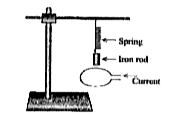Write the following steps in sequential order to explain the working of an electric bell.
(A) When current passes through the coil, it behaves like a magnet and attracts (pulls) the iron strip.
(B) No more does not coild behave as an electromag-net and the attraction between the coil and the iron strip is lost. Because of this the iron strip gets back to its original position and touches the screw.
(C ) The hammers connected to iron strip also moves and strikes the gong because of which, sound is produced.
(D) When the iron strip is pulled towards the coil, it loses contact with the screw and the circuit becomes open circuit.
(E). Once again the circuit is closed , and the above process is repeated.
A
ABCDE
B
EDCBA
C
BADEC
D
ACDBE
Video Solution
Text Solution
The correct Answer is:D
ACDBE
|
Topper's Solved these Questions
Similar Questions
Knowledge Check
Write the following steps in sequential order to explain the working of an electric bell.
(A) When current passes through the coil, it behaves like a magnet and attracts (pulls) the iron strip.
(B) No more does not coild behave as an electromag-net and the attraction between the coil and the iron strip is lost. Because of this the iron strip gets back to its original position and touches the screw.
(C ) The hammers connected to iron strip also moves and strikes the gong because of which, sound is produced.
(D) When the iron strip is pulled towards the coil, it loses contact with the screw and the circuit becomes open circuit.
(E). Once again the circuit is closed , and the above process is repeated.AABCDEBEDCBACBADECDACDBEWhen electric current passes through a wire it behaves like a _______.
AFuseBBatteryCMagnetDElementWhen electric current passes through a wire , it behaves like a magnet. This is known as : ...........
AMagnetic effect of currentBElectrical effect of currentCHeating effect of currentDOptical effect of current
How does a current loop behave like a bar magnet?
View SolutionExplain how a magnet gets demagnetized when an alternative current is passed through a coil in which the magnet is placed.
View SolutionHow can a magnet be demagnetized ?
View SolutionWhen current is passed through a wire wound around an iron rod, it produces
View SolutionWrite the following steps in a sequential order involved in the working of an electric bell.
(A) the armature is pulled towards the electromagnet
(B) The soft iron behave as an electromegnet.
(c) The circuit breaks and the electromagnet loses the magnetic property.
(D) The hammer hits the gong.
(E) Armature goes back and the circuit gets closed.
(F) The process is repeated and the bell rings continuously
(G) The circuit is closed
View Solution

